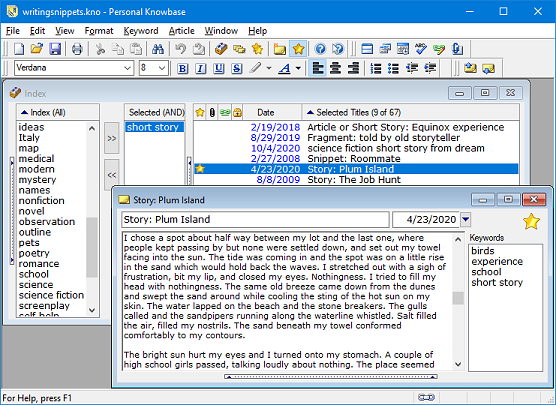Creating a Writing Snippets File with Personal Knowbase
Do you regularly delete perfectly good pieces of writing while editing? Do you have frequent "false starts" when you begin a writing project and stall? Do you have old unfinished attempts accumulating on your computer or in notebooks?
Consider keeping a writing snippets file where you can store miscellaneous pieces that don't have a home. You never know when these writings may be exactly what you need for a future project. And storing them away is less painful than deleting them.
Personal Knowbase notes manager provides a software solution for storing your extra material. Save deleted passages and undeveloped odds and ends. Tag them with keywords so you can locate them later when you have a place for them.

Keeping a Writing Snippets File
Experts say that writers must "kill their darlings" when editing. What they really mean is that you sometimes need to remove portions you've written that, when you look back at them, don't serve the full written work. This edict may apply to a passage, a character, or even an entire subplot. No matter how much effort you've put into it and how much you love it, if it doesn't fit into the final work, you must remove it.
This applies to nonfiction as well, when you've written a section that goes off on a tangent that doesn't serve your main point. To tighten your work, loose bits must go.
What you need is a central repository to save miscellaneous blocks of text that don't have an immediate home. Instead of painfully killing the unused parts outright, bank them away for future use or to spark ideas. Some could even be usefully developed as short social media posts if they don't fit into a longer piece.
Banking snippets can save time. While working on a future project, you may remember previously writing something like what you need. Checking your snippets file might avoid the need to rewrite what you already wrote. Even if you can't use the text exactly as it was originally written, it may provide the seed to develop what you need to say.
What to save
False starts. Sometimes you get an idea, start writing, and then stall, not sure where it's going. Store what you have. Someday you may get a new inspiration.
Deleted bits. Keep the passages that you edit out (murdered "darlings") that might be useful later.
Dreams. Record dreams that spark plot ideas.
Observations. Write up descriptions of promising observations. These can eventually provide realistic detail for scenes.
Early works and old efforts. Save stories and articles from when you started writing. You may look back at them and think they're poorly written, but they may spark new ideas. You may even decide to rework one or polish it using your newer skills.
Fragmented ideas. Save ideas that aren't quite fully formed. They may come together later.
Character names. If you get more name ideas than you can use for a project, save them for a future one.
“Every story, every incident, every bit of conversation is raw material for me.” ~ Sylvia Plath
Using Personal Knowbase
With Personal Knowbase, you can create a repository of your snippets. PK is a freeform database program for storing text notes. PK calls each note entry an "article."
Store each block of text as one entry. You can easily copy text from other Windows applications or type directly into a new article. Assigning keywords to each article creates an "index" to facilitate finding them.
As you add more and more articles, you build up a database of bits of writing that you can browse and search. When you find a new home for one, simply copy it out of the PK article and paste it into your regular writing software. Or, you can edit and develop your writing directly in PK itself, which features a full rich-text editor.
While you work, keep PK open in the background and copy displaced text in as you edit.
If you currently have miscellaneous writing chunks in notebooks or random computer files, gather them into PK so that you can browse and search them easily.

Keyword Suggestions
As you stash your writings into Personal Knowbase, tag each article with keywords. Your keywords form an index to your entries so that you can retrieve and group them according to their characteristics. To select useful keywords for an item, think about under what circumstances you might want to locate it again.
Here are some suggestions for keywords for writing snippets:
- Nature of the piece. Is it a raw idea? A plot outline? Or actual finished writing?
- Part of a story. Is it a description, character, background, scene, or bit of dialogue?
- Sources of material. Did it come from a dream, experience or anecdote, observation, or a deletion from another work?
- Origin of material. Did you find it in your old paper files? Write it for a class? The result of a writing exercise?
- Genre. Indicate genres and nonfiction categories. Fantasy, young adult, mystery, romance? Humor? Technical writing?
- Subject. Especially for nonfiction. Is it about computers, pets, music, travel, history?
- Type of finished work it may apply to. Short story, poetry, article, blog post, scene for a novel or screenplay?
Not ready to delete the writing snippets that you put your heart into, even though they don't fit into your current work? Instead, bank them away for future use. Someday, you might find the perfect place for that clever bit of dialogue banter.
Personal Knowbase is great for banking blocks of text. Try our fully-functional 30-day trial to play around with the software. Copy in some of your extra snippets and see how PK can help you organize them.
Search Site
Recent Posts
About
Personal Knowbase is a note management program for Windows. Organize free-form text information using keywords.
To see if Personal Knowbase is right for you, please download a fully-functional 30-day software trial.
Tags
attachments backup clipboard dates documentation education export files find formatting getting started import information management installation interface keywords network PK Reader portability print query registration reports research security settings site info small business support time management upgrade Windows writers